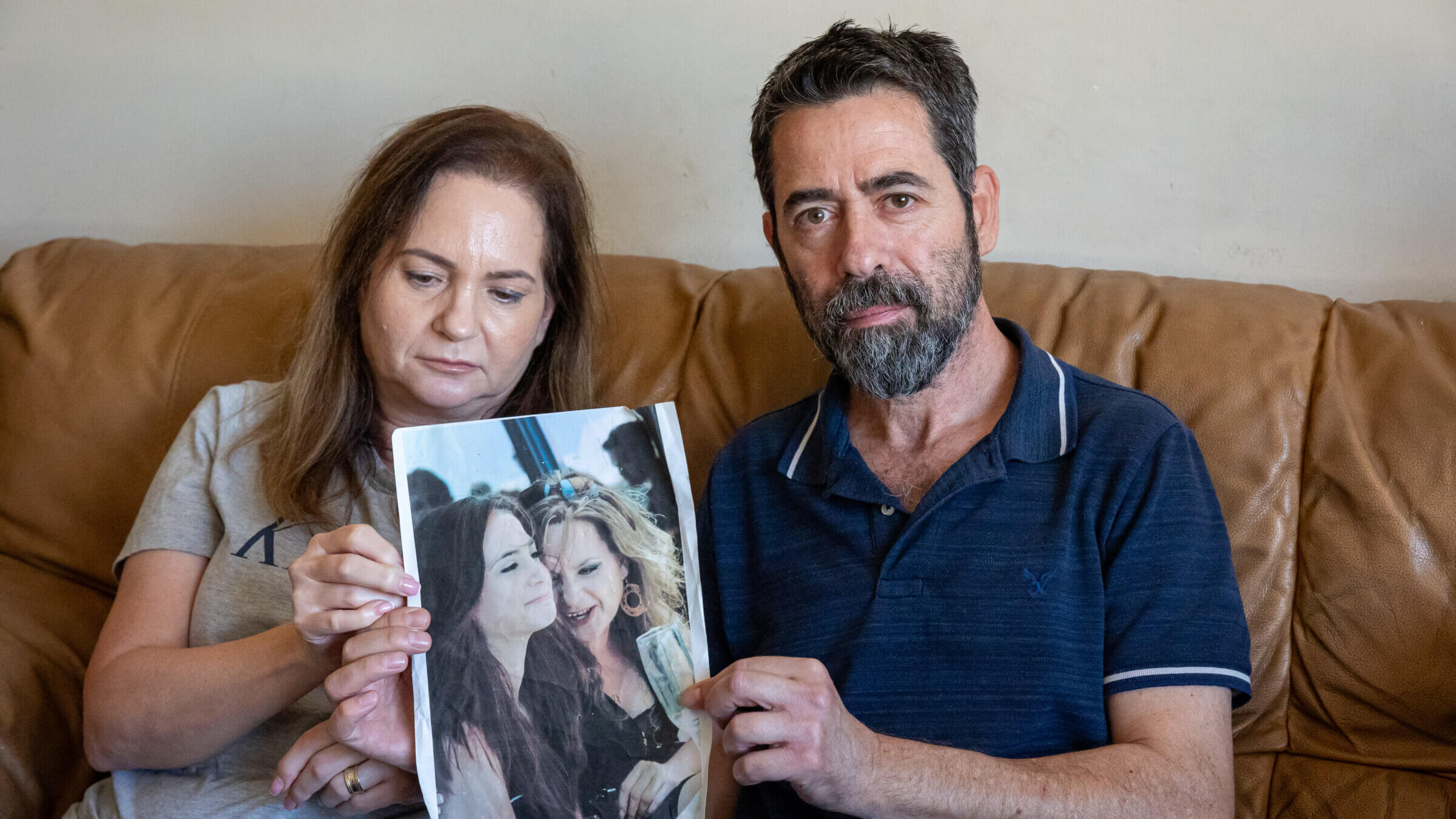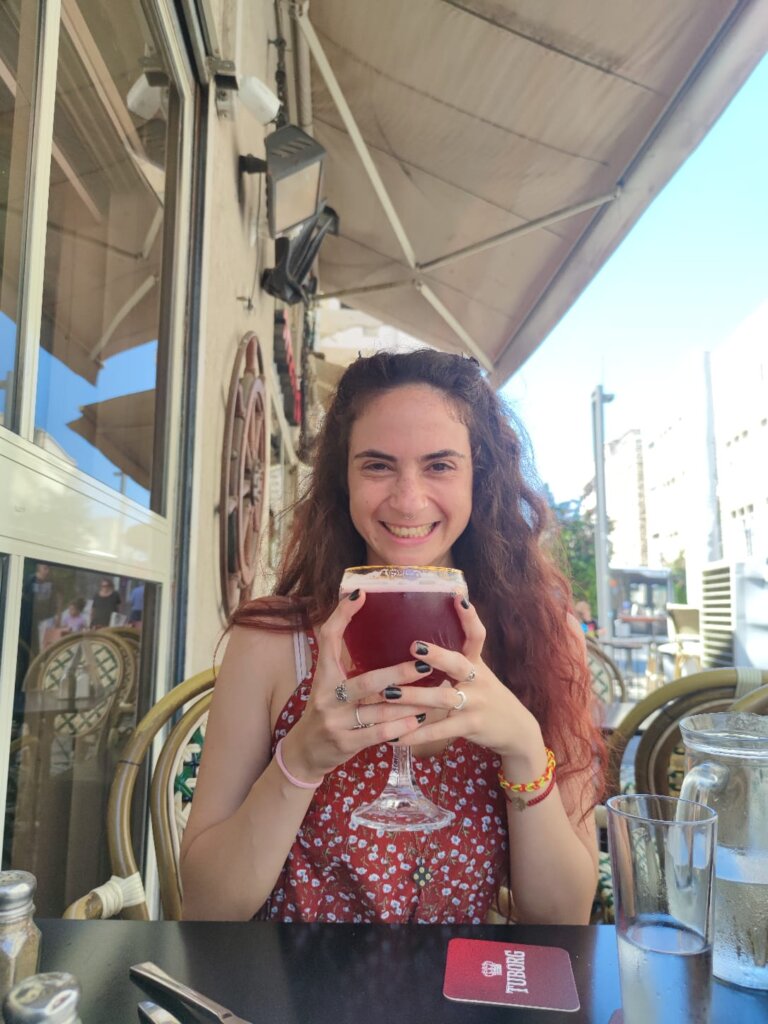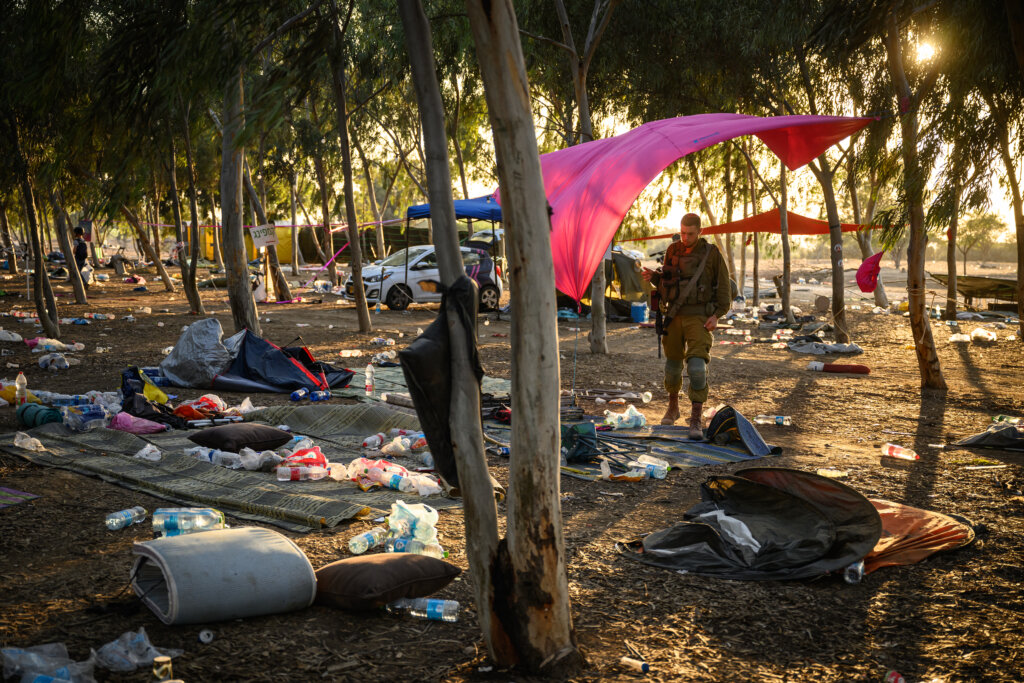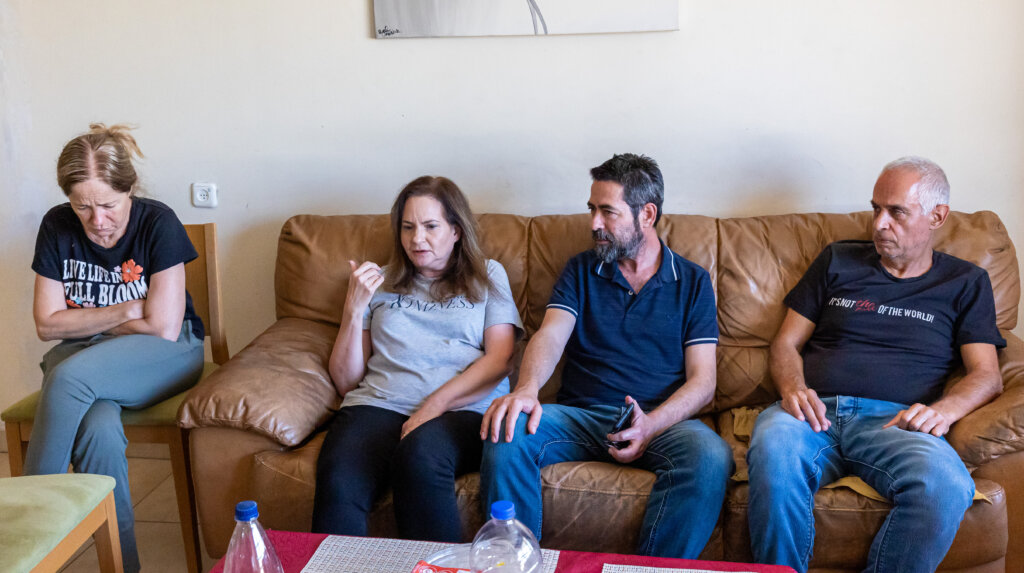‘At least we know that she’s alive’: The family of a young woman captured by Hamas insists on hope
Inbar Haiman, 28, was captured by Hamas at the Nova music festival

Ifat and Haim Haiman, of Petah Tikva, Israel, hold a picture of Ifat and their daughter Inbar. She was captured at the Nova music festival by Hamas terrorists on Oct. 7, 2023. Photo by Laura Ben-David for the Forward
Editor’s note: Two months after this story was published, authorities in Israel announced that Inbar Haiman was murdered in Hamas captivity.
PETAH TIKVA, Israel — It was 7 a.m. on Shabbat morning when Ifat Haiman’s sister-in-law called and woke them with urgent news: Israel was at war.
“What war, what is she talking about?” Ifat recalled thinking. She and her husband Haim went back to bed.
An hour or so later, they turned on the news. They couldn’t comprehend what was happening before their eyes. A terror attack was unfolding at the Supernova Sukkot Gathering, an annual dance party that attracted hundreds of young people from across the country. Their daughter, Inbar Haiman, was likely running for her life.
Ifat called her son Ido. She told him that his 28-year-old sister had attended the very party where a massive terror attack was now taking place. Ido forwarded his mother messages from Inbar, who was attempting to flee the chaos.
“We tried to tell her to be careful,” said Ifat, “to take care of herself.”

Inbar Haiman grew up in Petah Tikva, a diverse middle-class city just east of Tel Aviv. For the past three years, she has lived in Haifa, where she studies visual communication at the WIZO Academy of Design and Education. She shares an apartment with her boyfriend, Noam Alon.
“She has so many friends,” Ifrat, 53, tells me. “They love her so much. And that’s solely a tribute to her personality, her charisma, and her desire to give.” Before serving in the army, she spent her national service year teaching, in mixed Jewish-Arab schools in Israel’s south.
“She’s the most amazing girl that I’ve ever met,” Alon told Sky News on Thursday. “She’s everything for me and everything for her family.”
Nova, as the festival is known, is an all night psychedelic trance rave in Re’im, a tiny secular kibbutz just three miles east of the Gaza border. Colorful sun shades cover the area in front of the stage, near a statue of the Buddha. Stretched tents dot the surrounding desert, flanked by an orchard. “You go to be happy,” as one friend of mine who has attended in past years put it, “with other people who are happy.”
Now, water bottles, shawls, sleeping bags and blankets litter the cracked earth. Half-finished bottles of booze stock a makeshift bar, and half-painted canvases lie among ransacked suitcases. Attendees danced into the night; the music was so loud that many people saw, not heard, the first rockets fall at dawn.
Shortly after the rockets, terrorists arrived. They came on motorcycles, pickup trucks, jeeps and cars. They arrived on foot and even by paraglider. They shot and lobbed grenades at the festival attendees. At least 260 people were killed, and several others have been kidnapped — including Inbar.
‘We failed on Saturday’

For hours, the army was nowhere to be found. In one firsthand account, an Israeli journalist writes that he coordinated the rescue of his own son without any official help.
“We failed on Saturday. This is our responsibility,” IDF spokesperson Daniel Hagari told NBC News on Friday.
You can see for miles from Re’im on a clear day, which is a problem when you’re trying to run for your life. Many come to the festival especially for the isolation, and many packed into shared rides with strangers in order to reach it — and in order to flee.
Drone footage taken after the event reveals a long line of charred cars clustered near the exit, the only road out of the festival. Some of the vehicles’ windows had been shattered, and many doors were flung open, as if their passengers sought a quick escape. Many people managed to flee, only to be killed by Hamas while trying to drive back to safety. There is video of terrorists shooting people who had been playing dead. Others were killed in or on the run to neighboring kibbutzim. And several were captured and paraded through the streets of Gaza.
‘We know that Inbar is alive’

The Cohen family shared an audio file with me on Thursday, containing the testimony of two Re’im survivors who had last seen their daughter. It was recorded by Alon’s mother.
At around 8:40 a.m., the two men said, they hid with a group of about 30 other people underneath the festival stage. Someone said the terrorists were “closing in,” and that they should run. They inadvertently headed west toward Gaza — dazed amid the chaos and perhaps in an altered state of consciousness. This is a psychedelic music festival, after all.
The two men didn’t know Inbar. But the three of them ran — and hid, and ran — for hours.
“She was strong,” one recalled. “She was able to keep up with our pace.”
The trio thought they had made it to the shrubs, and then the orchards, of Kibbutz Be’eri — about six miles northeast, not west, of Re’im. But instead, they had run west, closer to Gaza. The Israeli men recall that two armed terrorists were “chasing the whole insane time.” One had a long metal rod, “20 meters long.” At some point, they were able to grab Inbar, and pin a knife to her throat.
Two additional terrorists emerged from the orchards on a motorcycle. The Israeli men said they tried to fight the terrorists off, but that the kidnappers were able to leave with Inbar on a motorcycle. They said she was crying.
Two other terrorists, one young and one old, chased after the Israeli men. “Look, we’re unarmed!” one of the Israelis yelled over his shoulder. He kept looking back. One of the terrorists was “rather chubby” and couldn’t keep pace — the Israeli men were able to escape.
Inbar’s parents confirmed their daughter’s identity from a video publicized by Hamas, now held by the IDF as evidence. Though Inbar does not appear clearly in it, her parents recognized their daughter by her distinctive patterned tights.
“We know from witnesses that Inbar is alive, and we hold Hamas responsible for returning her alive,” Inbar’s 53-year-old mother told me on Thursday. ”She is being held there against every convention that exists,” her father added.
“Communication folks from the army speak with us,” Haim, 54, told me. “Now things are starting to move, which hadn’t happened in the first days. It was very frustrating.”
But there are few signs of progress. “We’re on our own as a family,” he adds. “We do have friends who are helping us,” some of whom have opened their own makeshift “situation rooms,” working together to find more information on and spread awareness of Inbar’s plight.
“We’re constantly busy, not thinking, working to free Inbar,” said Haim.
“Like robots,” Idit adds.
“Is she in Gaza? Is she eating? Is somebody caring for her if she was wounded? We don’t know. It’s really hard to feel that,” said Haim. “The lack of information, that we don’t know.”
But the family remains optimistic, and insists that others must hold onto hope.
“It’s not encouraging that she’s imprisoned. But at least we know that she’s alive.”
The Forward’s Chana Pollack assisted with Hebrew translations.






















